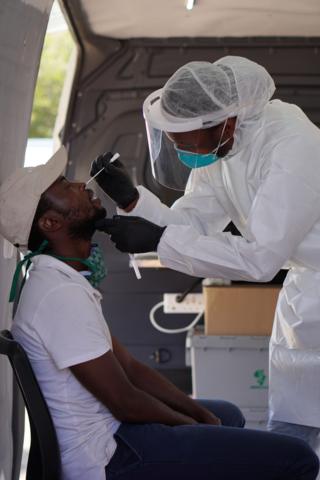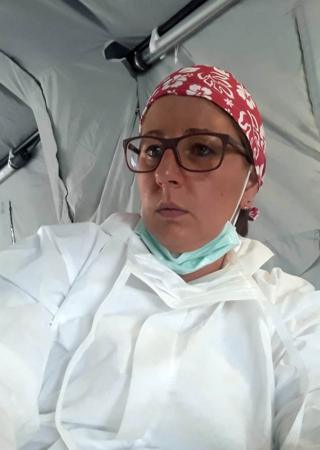Coronavirus: Four nurses on four continents tell their story
With more than four million reported cases worldwide, the coronavirus pandemic has brought the work done by nurses into the spotlight.
To mark International Nurses Day, the BBC spoke to nurses working on four different continents, to learn about the challenges they face in the battle against Covid-19.
Nursing day is celebrated on 12 May, the birthday of Florence Nightingale, the founder of modern nursing.
‘Mum told me she feels grateful to have a son like me’
“At first my family weren’t comfortable with me joining the fight against Covid-19. But when they saw the pictures of my protective gear they understood that I am protected enough,” says Mzwakhe Mohlaloganye.
Mzwakhe, a 37-year-old father-of-two, has been a nurse for five years and has been part of the mobile Covid-19 team in Johannesburg for two months.
South Africa has done an exceptional job at “flattening the curve” and many people say that community testing and awareness is a big part of that.
The team screens and tests people in the local community, prioritising those over the age of 59 and those with chronic medical conditions.
Mzwakhe has found the role rewarding, seeing it as an opportunity to learn about the disease and how it connects with the different kinds of conditions in his patients.
However, his family were initially reticent about his new role and were concerned about his welfare.
 Image copyright
Image copyright
Christian Parkinson / BBC
“Mum told me she feels grateful to have a son like me – one of the people who are out there fighting for them.”
Reflecting on the efforts made by his team on the frontline and his work as a nurse, Mzwakhe feels he plays an important role, not just helping to raise awareness but helping to save communities.
“It makes me feel like a superhero because I feel like I am a lifesaver in my country.”
He also feels that nurses are appreciated now more than ever.
“For nurses all over the world my message is don’t give up. You must do whatever you can to help contain the virus. Never feel like a failure.”
‘It was moving but also unsettling’
It became a symbol of a country overwhelmed: a photo of an exhausted nurse in her facemask slumped asleep over her computer. Italy had been struck by the virus – the first western country to be hit so badly – and the picture of Elena Pagliarini encapsulated the devastation it was wreaking.
“It was such a dramatic situation”, Elena told the BBC, “some patients were dying in front of me. We worked all night. At 6am, I stopped and rested briefly on the desk and a doctor took this picture. It was an angst-ridden moment.”
She says she hadn’t realised the importance of the photo until she was contacted by journalists and people she didn’t know.
“I realised the picture became bigger than just the moment it captured. It was moving but also unsettling.”
By mid-March, when hospitals in northern Italy were at bursting point and hundreds were dying each day, Elena herself became infected, losing her sense of smell and taste. She stayed at home for 23 days and returned to work on 2 April, as Italy reached the peak of the outbreak.
 Image copyright
Image copyright
Elena Pagliarini
Since then, infections have fallen dramatically and intensive care occupancy has dropped to a manageable level. Italy has started to ease its lockdown – the world’s longest. “We’re now in phase two”, Elena says, “we still have cases coming in but the symptoms are lighter: sore throat, dehydration, strong headaches – but it’s not an emergency situation.”
At least 160 health workers have died in Italy. The country’s medics – as everywhere – are seen as the heroes of this battle.
“I’m proud of my work”, says Elena. “That photo shows just me but it should represent all nurses and doctors.”
‘They were over 70 and survived’
Gabriela Serrano, a nurse working in the US, has fond memories of the day she saw her first Covid-19 patient discharged.
“She was so happy when I wheeled her out of the hospital. She said: ‘It is so good to see the sun shine and breathe fresh air'”.
Gabriela has been a nurse for seven years. During the pandemic she worked in a hospital on the outskirts of San Francisco.
“The two Covid-19 patients I was taking care of had underlying health conditions and were above 70. Yet they managed to survive. This gives me hope.”
Gabriela, 31, has seen three non-coronavirus deaths in the past two months. She described how she had cared for a dying woman.
“She was a bit responsive on the first day but was non-verbal. l explained everything I was doing to her, even though she wasn’t able to talk back to me.”
The next day, the patient was not even opening her eyes.
The hospital authorised a visit from relatives during the patient’s final hours. Unfortunately, she had no close family and her best friend opted to stay away from the hospital.
“I sat with her, held her hand and just told her it was going to be okay. I was there. She had someone with her,” says Gabriela.
“I don’t know if she could hear me at that point, but it was the best I could do for her.”
Her hard work didn’t save her job. She is a travel nurse, as they call those working on short-term contracts. General patient admissions are down, as people fear contracting the virus and many stay away from hospitals for all non-emergency treatment, so the hospital she was working at decided to terminate her employment.
“I’m pretty optimistic about getting a job within a month. I’ll take what I can get.”
‘A single infected person can threaten the whole population’
“On 24 March we had our first Covid-19 positive case. Immediately I thought about two tribal patients in my hospital. I asked them to leave,” says Shanti Teresa lakra.
Shanti has made a name for herself providing health services for the rapidly declining tribal groups of India’s Andaman and Nicobar islands and is a recipient of the Florence Nightingale award, the highest professional recognition for nurses in India.
She was taking care of a five-year-old boy from the Jarawa tribe affected by pneumonia, as well as a woman from the Shompen tribe seeking fertility treatment.
Jarawas made contact with the outside world only in 1997. The naked hunter-gatherers live in a forest reserve about 80km (50m) from Port Blair, where Shanti now works.
A week after the boy was discharged, she went to the forest area to check on him.
“He had fully recovered. Since I can speak a bit of their language, I told them to move deep into the jungle and stay there.”
Isolation served as a shield for these aboriginal groups for thousands of years, but expanding settlements over the past century have decimated their population. Shanti says there are currently some 450 members of the Jarawa tribe.
“Their immunity is low. A single infected person can threaten the whole population.”
Reporting by Swaminathan Natarajan, Mark Lowen and Christian Parkinson